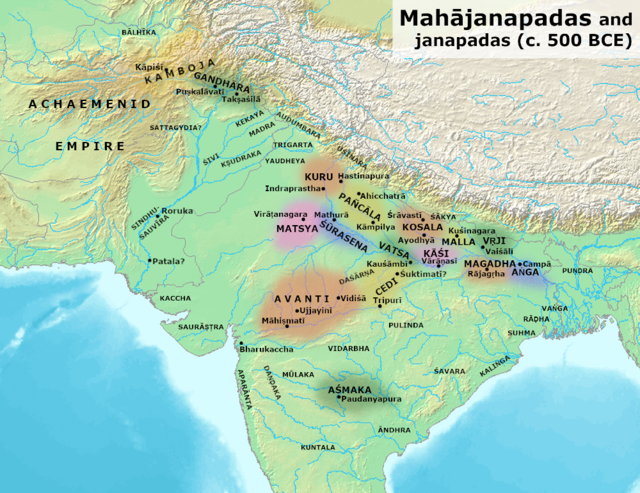Pulinda
Ancient Mlechha tribe From Wikipedia, the free encyclopedia
Ancient Mlechha tribe From Wikipedia, the free encyclopedia
Pulinda (Sanskrit: Pulinda) were an ancient non-Ayran tribe of south-central Indian subcontinent, whose existence is attested during the Iron Age.[1][2] Pulindas were mentioned in Aitareya Brahmana of the Rigveda (c. 500 BCE) as descendants of Sage Vishvamitra, along with Andhras, Pundras, Sabaras, and Mutibas.

During the later Vedic period, the Pulindas were living to the south-east of the Daśārṇas.[2]
Though clearly associated with the Vindhyan region, the Pulindas are sometimes believed to have had multiple tribal branches that ranged up to the Himalayan region and Assam.[3] In the Himalayan region, ancient Indian literature often mentions them in conjunction with the Kiratas.[3]
Aitareya Brahmana of the Rigveda According to Aitareya Brahmana of the Rigveda, sage Vishvamitra had hundred sons, fifty of them were older than Madhuchhanda, and fifty were younger than him. The older ones were not pleased with (the installation of Sunahsepa to the primogeniture). Visvamitra then pronounced against them the curse, “ You shall have the lowest castes for your descendants. ” Therefore are many of the most degraded classes of men, the rabble for the most part, such as the Andhras, Pundras, Sabaras, Palindas, and Mutibas, descendants of Visvamitra...”[4]
Puranas
Srimada Bhagavatam refer Andhras, Pundras, Sabaras, Palindas, and Mutibas are referred to as Mleccha.
The Rock Edicts of Ashoka (269 BCE - 231 BCE) mention the Pulindas, their capital Pulinda-nagara, and their neighboring tribes. Vayu Purana mentioned their capital located in present-day Jabalpur District of Madhya Pradesh state.[5]
Likewise here in the king's (Ashoka ) territory, among the Yonas and Kambojas, among the Nabhakas and Nabhapamkits, among the Bhojas and the Pitinikas, among the Andhras and the Pulindas, everywhere (people) are conforming to Beloved-Of-God (Ashoka) instruction in morality.
— Ashoka, Rock Edict 13 , Kalsi Rock, South Portion
Basak identifies them with the hill tribes of the Vindhya and Satpura ranges, more specifically the Bhils.[6] Pulindas together with the Sabaras are mentioned by Kautilya in Arthashastra.[7]
Seamless Wikipedia browsing. On steroids.
Every time you click a link to Wikipedia, Wiktionary or Wikiquote in your browser's search results, it will show the modern Wikiwand interface.
Wikiwand extension is a five stars, simple, with minimum permission required to keep your browsing private, safe and transparent.